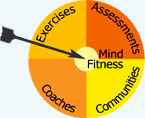Brain Fitness Programs, “Brain Gyms”…Explained

Thanks to MindHacks for the link to a good Washington Post article, “Pumping Neurons”.
A couple of quotes:
Recent research shows that the brain remains plastic, or basically trainable, throughout life. In a study published in the Journal of the American Medical Association in 2002, significant percentages of the 2,802 participants age 65 and older who trained for five weeks for about 2 1/2 hours per week improved their memory, reasoning and information-processing speed.
When we learn, we create physical changes inside our heads. By practicing a skill, we repeatedly stimulate the same area of the brain, which strengthens existing neural connections and creates new ones. Over time, we can become more cognitively efficient, using fewer neurons to do the same job. And the more often we fire up certain mental circuits, the easier it is to get them going again.
The reporter then goes on to review a number of websites that offer purely online exercises, i. e., she doesn’t review any of the software-based programs such as Posit Science for improving auditory speed, RoboMemo for working memory training, MindFit for 14 brain fitness areas/ cognitive skills , Intelligym for basketball game-intelligence, FreezeFramer for stress management, and others.
We will be reading more and more articles like that-which is good news for a nascent field. Now, I would recommend anyone considering such programs to always ask the questions:
- What does the specific program look like: how many hours a week, how many weeks, and to accomplish what outcomes? Some programs we have seen leave it so open that it is unclear for us how users are supposed to get what benefits. When we go to the gym, and we tell the coach what our objectives are, we typically get a good structure and program to follow.
- What research has been published, or has been submitted to publication, that supports that if a person follows that precise program he or she will likely obtain those promised benefit?
- How do any benefits transfer to real life and to our cognitive abilities/ skills? by definition, by playing a game we get better at a game. Which is great in itself, because we learn something new, and it builds self-confidence. Now, how do I know that transfers into an expanded “mental muscle” or cognitive ability, that will also help me in domains outside the game itself?
Overall, the article is a good introduction to the concept of Brain Fitness, or brain gymnasiums, or mental gymnastics, or mental calisthenics ‑as you wish.
Here you also have some recent posts that can enrich this conversation:
On the Science
— Overview of the Science Behind Brain and Mind Fitness
— Brain Fitness Glossary
— Why we need more than crosswords and sudoku to protect/ improve our Brain Fitness
— Use It or Lose It: what is “It”?
On Brain Fitness Programs
— SharpBrains’ vision for Brain Fitness: assessments, programs, coaches, communities
— Overview of Brain Fitness Programs: The Brain Fitness Revolution is here with us
— Fun 10-minute survey on Brain and Mind Fitness
— Statistics on why people play casual games online-including perceptions of cognitive and memory improvements, and stress relief
Interviews with neuroscientists
— Interview with the Torkel Klingberg, Scientific Officer of Cogmed Working Memory Training
-Interview with Dr. James Zull, Professor of Biology and Biochemistry at Case Western University , on why Learning is critical, and how we Learn
Good press articles
— Good popular press articles on brain change, brain plasticity, successful aging, staying sharp
— More Good popular press articles: on mental stimulation, Brain and Cognitive Reserve, stress, physical exercise and humor
Interfaces with other pillars for Brain Health and Brain Fitness, apart from mental stimulation
— Physical fitness and Brain Fitness
— Why Managing Stress is as important as Stimulating our Minds
Enjoy


